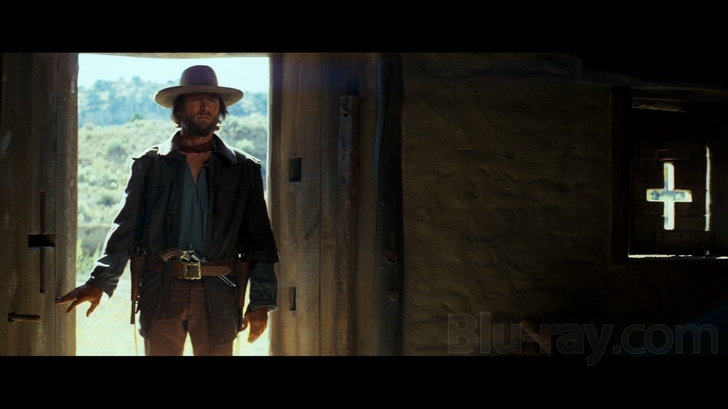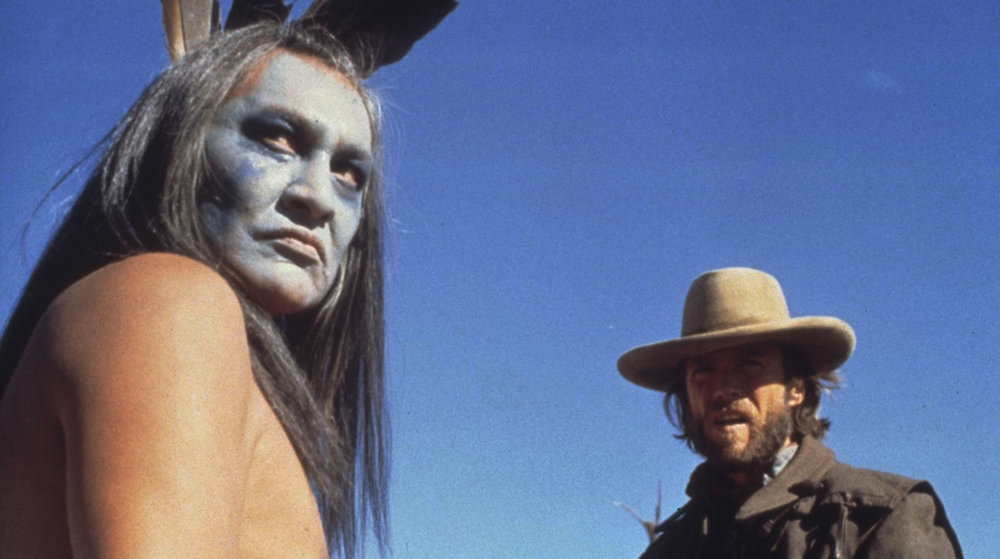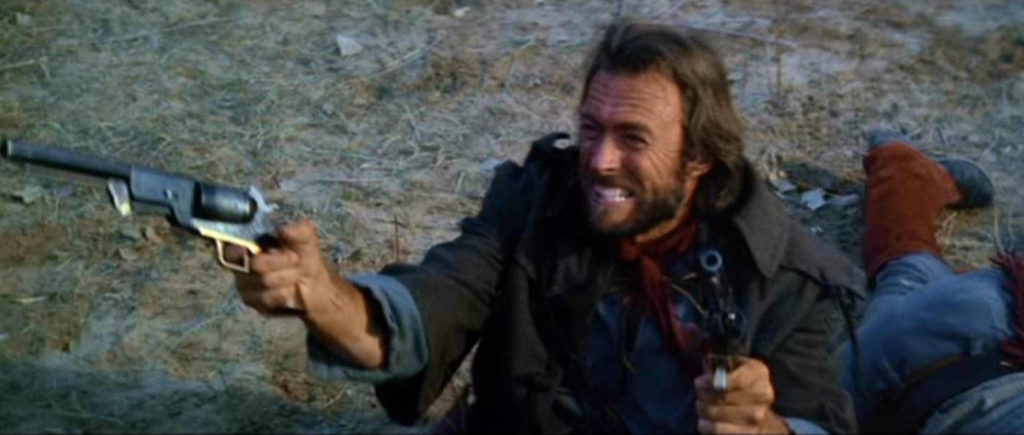
A top tier Western – and one of my personal favorites. is coming up on Turner Classic Movies on April 2 – Clint Eastwood’s The Outlaw Josey Wales. I venerate Westerns, and I rate John Ford’s The Man Who Shot Liberty Valance and The Searchers and Fred Zinneman’s High Noon at the top of the genre; The Outlaw Josey Wales fits in the tier just below, among the rest of Ford’s portfolio and those of Anthony Mann, Sam Peckinpah, Sergio Leone, Howard Hawks, Budd Boetticher and other masters. Those masters include Clint Eastwood himself, having gone on to win the Best Picture and Best Director Oscars for Unforgiven.
Clint plays Josey Wales, a Missouri farmer whose family is massacred by terrorist partisans at the beginning of the Civil War, leading Josey to join rival irregulars. At the end of the war, Wales refuses to surrender and heads West to restart his life. But his old enemies hound him, and there is a price on his head which draws bounty hunters. As Josey seeks sanctuary westward, he is joined by a motley convoy of Native Americans and White settlers, which Josey defends against outlaw bands and hostile Native Americans. The dramatic tension revolves around whether Josey will survive, and, if so, whether he will find peace.
Josey has blood on his hands from his part in wartime atrocities. He’s no longer looking for trouble, just trying to find a place where he can be left alone. But violence follows him – from the men that are hunting him and the dangers that he will encounter on the journey. Josey says, “Whenever I get to likin’ someone, they ain’t around long.” A companion retorts, “I notice when you get to DISlikin’ someone they ain’t around for long neither.“

The sympathetic portrayal of Native Americans (by Native American actors) is another hallmark of The Outlaw Josey Wales. Josey’s main buddy is Lone Watie, played by Chief Dan George (actually a Native Canadian Squamish) in a sparkling performance. Six-foot-five Creek actor Will Sampson (One Flew Over the Cuckoo’s Nest) and Navajo actor Geraldine Kearnes are also excellent.
Josey must run a gauntlet of the scariest movie bad guys since Kansas City Confidential – Bill McKinney, John Davis Chandler, Len Lesser, John Quade. It’s such a dastardly slew of baddies that it leaves a more complicated role for John Vernon (villain of Point Blank and countless episodes of Mission: Impossible and Dean Wormer in Animal House).
Sam Bottoms play an ill-fated and callow pal of Josey’s. Sondra Locke’s character represents purity and innocence as a counterpoint to Josey’s jaded world view. The cast is peppered with recognizable character actors: Royal Dano, Sheb Wooley, John Mitchum.
Philip Kaufman had co-written the screenplay, and as director, had cast the movie and prepared the shoot, but Eastwood, impatient with what he viewed as too many takes, had Kaufman fired and took over himself. This was Clint’s fifth picture as a director and his second Western (after High Plains Drifter). Eastwood’s work as director is excellent, but it’s important to look at Josey Wales in light of both men’s contributions. In the long run, Kaufman’s career didn’t suffer – he went on to direct The Invasion of the Body Snatchers, The Right Stuff and The Unbearable Lightness of Being.

What about a former Confederate soldier as hero? The source material for the screenplay was a novel by the racist propagandist Asa Earl Carter, who co-wrote George Wallace’s “Segregation today, segregation tomorrow and segregation forever” speech. However, in Kaufman’s screenplay, Josey isn’t a hater of people because of what they were born as, he hates for what they have done to him and his loved ones. Apolitical, he joins the side that didn’t kill his family. Asa Earl Carter probably wouldn’t have liked that – or the sympathetic portrayal of Native Americans as equals to whites. The Outlaw Josey Wales is now accepted to be a revisionist Western . Eastwood has since said that he considers it an anti-war film, which has much merit.
One more historical note, the Civil War soldiers depicted were not regular Union or Confederate troops, but guerilla raiders that came out of the Bleeding Kansas conflict. These units did exist on both sides in Kansas and Missouri, and were noted for their massacres of unarmed civilians as well as combatants. Josey joins up with one of the most notorious, William T. “Bloody Bill” Anderson. As both a victim and a perpetrator, Josey has seen the most inhumane human behavior.
On set, Clint Eastwood and Sondra Locke began a 14-tear relationship (which did not end well).
Qualified as “culturally, historically, or aesthetically significant” by the Library of Congress, The Outlaw Josey Wales has been selected for preservation in the National Film Registry. Jerry Fielding’s music was nominated for an Academy Award. The Outlaw Josey Wales plays frequently on TV and is streamable from HBO (subscription), Amazon, AppleTV, Vudu and YouTube.
